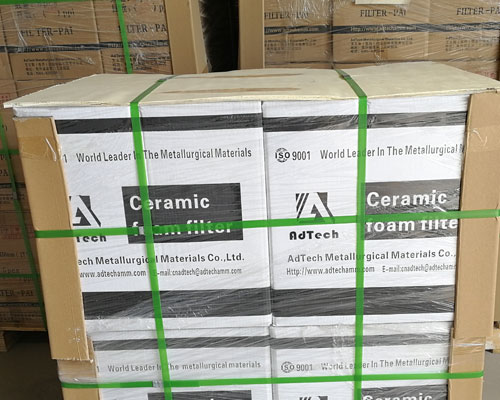The constant improvement and development of its filters for the filtration of molten metals has made it a well-known partner. Alumina ceramic foam filters mainly for the filtration of aluminum and aluminum alloys in foundries and foundries. With their excellent resistance to attack and corrosion from molten aluminum, they can effectively remove inclusions, reduce trapped gases and provide laminar flow, resulting in significantly cleaner metal. Cleaner metal results in better quality castings, less scrap and fewer embedding defects, which contributes to the bottom line. Apply to improve the quality of aluminum alloy and other non-ferrous alloy castings. Improve metallurgical structure Improve mechanical properties transform turbulence into the laminar flow.
Alumina ceramic foam filters are available in all standard sizes and different thicknesses. We offer the full range of porosities from PPI 10 up to PPI 60 (PPI = pores per inch). Custom filters cut to size are also possible.
Ceramic Foam Filters of Molten Metals Filtration Functions
* Decontaminate molten metallic liquid
* Simplified locking system
* Improve the metallurgical structure of castings
* Reduce cast imperfections
* Improve the casting quality rate
* Reduce internal reoxidation defects of the casting
* Reduce surface defects after machining of castings
Ceramic Foam Filtration Advantages
- Increased fluidity
The removal of inclusions makes the metal more fluid, which facilitates mold filling, better casting structure and better castability of thin sections. - Reduced wear of molds and dies
Removing inclusions and other non-metallic debris from the melt reduces die welding and mold-metal interaction, which degrades mold surface and life. - Longer tool life
The oxide, as well as intermetallic inclusions, create “hard spots” which damage tools during machining and finishing operations. Filtration reduces tool wear and increases productivity. - Less rejections
Inclusions nucleate porosity, create hot tears upon solidification, cause surface defects that alter appearance and often reduce mechanical properties. In many cases, filtration reduces releases from such causes to virtually zero. Efficiency improvements to nearly 100% and rejection rates reduced to 0% or so are common.

